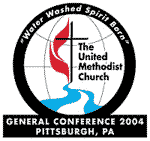United Methodist Church
General Conference 2004
Pittsburgh, April 27–May 7
250 Years of History
As our elected delegates go the UM General Conference in Pittsburgh this April 26-May 7 to decide and plan our church’s continuing mission and direction for the next four years and beyond, there will be some people there working very hard to polarize the church and change the essential character and historic role of United Methodism within the larger Church. Who is trying to make UM more strict, in what way; and what in fact is UM’s historic character?
A group called the Institute on Religion and Democracy (founded in 1981) has been funding and coordinating various groups in our denomination and others to help them take over and change our Church the way radical fundamentalists recently took control of the Southern Baptist denomination. These groups, such as the Good News movement, are pushing to narrow down our broad Wesleyan heritage of open theological dialogue to a rigid authoritarianism, and to dismantle many of the social service/justice ministries that have been part of our Church since Wesley was speaking out (in the 1700s) against slavery and war, educating the poor, pushing for laws against child labor, going door-to-door asking for money, food, and clothing for the needy, etc.
For Wesley, Christianity was not belief in doctrines, but trust in God, and loving care for people. He said repeatedly: “Orthodoxy, or (holding) right (theological) opinions, is at best a slender part of (Christian) religion, if it can be allowed to be any part of it all.” Instead of pushing Methodist Christians to adhere to a narrow “creedal” definition of faith, Wesley suggested, we need to use the whole breadth and diversity of viewpoints found in (1) scripture, 2000 years of Church (2) tradition, the lessons of (3) experience, and the best efforts of human (4) reason as guides to faithful Christian living.
The IRD-supported critics in our denomination, however, are pressing to narrow all that to a very restricted reading of (1) and (2): calling for the re-ordination of all clergy, requiring adherence to a narrowly creedal definition of the faith, as well as requiring the same pledge of doctrinal restriction for UM seminary, college, and university faculty, and of all our denominational boards and social agency staffs as well—all of this to be enforced by heresy trials! And further, the century-old independence of our UM Women’s Division of the Board of Global Ministries would be brought under tight control; and the Board of Church and Society ministries of social service and justice advocacy would be eliminated, along with the Commission on Religion and Race, and Commission on the Status and Role of Women.
These issues will be explored in subsequent articles in this series. For a detailed listing of the specific changes proposed by various groups in our denomination, see United Methodism at Risk: a Wake-up Call, by Leon Howell, Bishop Dale White, and Scott Campbell. Information Project for United Methodists, 2003, is available at our local United Methodist Cokesbury Bookstore in Aurora (across from Fox Valley Mall), 630-585-0996.
John Gillham


